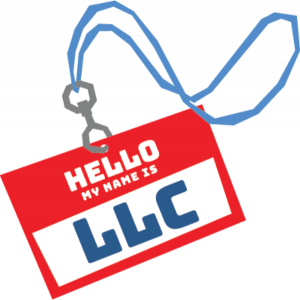How to Choose an LLC Name
To choose an LLC name, you’ll need to check your state’s LLC name requirements and come up with a name that’s unique, memorable, and on brand for your business. Naming your business is one of the most important decisions you’ll make about your business, which is why some business owners decide to protect their business name by registering a trademark. Here’s our guide to coming up with a killer name for your LLC.
Steps to Naming Your LLC

1. Understand State LLC Naming Requirements
Every state has its own rules for how LLCs can name their business. The rules can be found in your state’s statutes, often in the state’s Limited Liability Company Act. LLC naming rules may be slightly different from state to state, but in every state, there are three main rules you need to follow.
Your LLC Name Must be Unique in Your State
Most states’ LLC statutes require your business name to be “distinguishable” from the other business names on record with the state. This just means it can’t be too similar to another business name in your state. How can you find out if your business name is unique? Do a quick Business Name Search in your state. It’s important to note that if your desired name is taken, adding articles like “the” or “and” usually won’t cut it—the name will still be considered too similar. And if your name is too similar to another name on record with the state, the Secretary of State will likely reject your filing.
Doing a secretary of state business search guarantees your name isn’t taken at the state level, but you should also consider checking for federally trademarked names. You can perform an online search through the United States Patent and Trademark Office (USPTO) by using their Trademark Electronic Search System (TESS). Using the TESS system is similar to searching your name on a state business name search. Enter your potential LLC name and search through to see if there are any living trademarks protecting it from use.
Your LLC Name Must Include an Identifier
An entity identifier is just what it sounds like—a word or abbreviation that identifies what kind of entity your business is. If you’re starting an LLC, your identifier will be “Limited Liability Company” or some version thereof, like “LLC,” “Limited Co,” or “Ltd. Co.”
Don’t like identifiers? You’ll have to file for a DBA or “doing business as” with the secretary of state where your business will be formed. A DBA allows you to operate your business under a different name than your LLC’s legal name (which will include an identifier).
Your LLC Name Can’t Use Restricted Words
Most states have rules about what kind of words you can’t use in a business name. Usually, you can’t use words that might mislead the public or suggest your LLC is something it isn’t. For example, you typically won’t be able to use words like “police,” “federal,” or “bank” in your business name.
Similarly, you can’t include an incorrect entity identifier in your business name. For example, you couldn’t name your LLC something like Dave’s Corporation, LLC or Heartstrings Nonprofit, LLC. Some states also have rules barring you from using any words considered vulgar.

2. Brainstorm Your LLC Name
Now that you’re aware of the legal requirements you’ll have to meet, get out a pen and paper—it’s time to brainstorm possible names for your LLC. You’ll want to make sure your LLC name is on brand for your business. Your brand is your company’s identity—it’s the character and vibe you want your target audience to associate with your business. Okay, but how do you come up with a business name that does that? Here are some possible routes you can go.
Descriptive LLC Names
A descriptive business name is just what it sounds like—a name that accurately describes what your business does. For example, if you were to see a truck with Jim’s Backyard Desert Landscaping, LLC, painted on the side, you’d know more or less that you could hire this business to plant drought-tolerant plants in your yard. You don’t have to watch a commercial or read an advertisement to know what this company does. While the name may not have a ton of style or originality, it goes a long way towards explaining the business to potential customers.
On the other hand, a business name like Landscapes by Jim, LLC says a lot less. What kind of landscaping does this business do? Commercial or residential? Are we talking native plants or a perfectly manicured lawn? Using a descriptive business name can help you reach your target audience more effectively.
Creative LLC Names
A creative business name is more about evoking a feeling or telling a story than it is about describing your services or products. For example, a business named Pearl & Rose, LLC could sell anything from fancy cocktail kits to online dating consultations. However, the name has a western, feminine style that tells you something about this business’s brand identity.
Creative names are great for conveying style and evoking a feeling, but if you use one, you’ll need to do more advertising work to explain what services or products your business will offer.
Completely Made-Up LLC Names
Ever heard of Google? You can name your business something meaningless like Flordlurkle LLC or Schmoopz LLC and you probably won’t have to worry about it being too similar to another name on record with the state. However, you’ll have to do a lot of work to communicate to your target audience what your business sells and what your brand identity is. That said, made-up names are often the strongest trademarks.

3. Check Domain Availability of Your LLC Name
Even if you don’t plan on getting a website for your business, doing a domain search will help you weed out any potential competition. You can simply use a search engine to research your potential LLC name to see if any websites or social media profiles come up with the same name or one similar. There are also domain name search engines you can use.
You’ll also want to consider your potential social media presence. Will your LLC name stand out on Twitter, Facebook, or LinkedIn? You can search those social media platforms to see if your LLC name or any variation on your name is available. If you have a DBA or plan on getting one, also search your potential DBA names for competition and availability on the internet and social media.
4. Lock Down Your LLC Name
If you’ve come up with a business name and double-checked it against your state’s naming requirements and business database, you’re ready to lock it down. By that, we mean it’s time to reserve, register, and/or trademark it so that it’s yours and can’t be taken by another business. Here’s how.
Reserve Your LLC Name
If you’ve chosen a business name before you’re ready to form your LLC, you can reserve your name with the state and keep it on hold until you’re ready to start your business. Each state has different filing fees, times, and applications, though the processes are similar. Filing fees vary but are usually between $15-$75 and hold times are generally 90-120 days.
Reserving your business name is helpful if you’re trying to buy time before you start your business, but doing so has some drawbacks. For one, it costs extra—filing fees are generally between $15 and $75. Plus, some states require you to cancel your name reservation before you form your business. This extra step can add a few days to the time it takes to form your business.
Form Your LLC
Once you’re ready to form your LLC, you’ll file articles or certificates of organization with the secretary of state. The filing fees for your articles of organization range from $40-$500, depending on your state. Once the state has processed the paperwork, your business name is officially registered. This means it’s off-limits for another business to register.
Trademark Your LLC Name
A trademark is a design, symbol, word, phrase, or any combination that represents your brand’s goods or services. By trademarking your LLC name, you are legally protecting your name. You can apply to trademark your name in the state where you form your business or federally, with the USPTO. To apply to trademark at the state level, you’ll file an application with the trademark office with fees usually ranging from $50-$100.
State-level trademark protection only protects you within the state, though. Federally trademarking your LLC name with the USPTO protects you in all 50 states, but it’s a tougher and more expensive process.

LLC Naming FAQs
Yes! Each state has its own process for changing a business name, but in most states, you’ll need to:
- check availability in your state
- get approval from a majority of members as outlined in your operating agreement
- file Articles of Amendment (or equivalent) with the state
Typically, this will cost you between $50-$100. Once you change your name with the state, you’ll need to notify the IRS.
Learn more about changing your LLC name.
There’s no legal reason why you can’t, but there are a few drawbacks to naming your LLC after yourself.
For one, it won’t protect your privacy—your name will be on all your advertisements and marketing materials. For another, your legal name likely won’t describe to your customers what your business does or do much work in terms of branding or storytelling. For these reasons, we’d say it’s probably best to come up with an original name for your LLC.
Yes. Attaching an entity identifier to your LLC name like LLC is a state requirement to help the secretary of state and customers know what type of business your LLC is.






